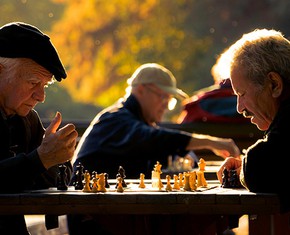The views expressed in our content reflect individual perspectives and do not represent the authoritative views of the Baha'i Faith.
We human beings can have a wide variety of feelings for one another. By itself, the word love can’t possibly encompass this entire emotional phenomena, but must be combined with a host of descriptors.
Consider, for example, these diverse varieties of love: passionate love, brotherly love, unconditional love, erotic love, divine love, love of humanity, kinship love, compassionate love, affectionate love, cherished love, amorous love, adoring love, worshipful love.
RELATED: Spiritual Dating: Creating Connections That Go The Distance
Some of these feelings can fool us. Romantic love, for instance, often creates an illusion which contains the seeds of its own destruction. Born from a desire to create a feeling of wholeness with another, romantic love requires spending our energy to seek union with a partner – but that expectation of gratification, the basic plot of every romance novel and almost every love song, is often fleeting.
Longing for another and then finding them feels like falling in love, like a process over which we have no conscious choice, something that happens to us rather than something we create. Romantic love often operates outside of one’s awareness as an unconscious response to the expectation of need fulfillment.
RELATED: How the Creator Teaches Us to Love – Indirectly
But the creation of a condition of inner wholeness is not found in the arms of another. In fact, the inevitable failure to attain this kind of wholeness can result in a power struggle of self-centered, wounded interactions.
How, then, do we create the kind of union that nurtures and endures? It seems to me that building a satisfying relationship has four distinct aspects.
1. Starting with Divine Love
The first and most important aspect is divine love – the love of God for humanity and the love we have for God. This is the source from which all attraction flows, and this spiritual energy nourishes and gives life to the other three aspects of a sustainable relationship. When we recognize we are essentially spiritual beings, and that our sense of wholeness comes from within, we have a firm foundation on which to build, as these passages about God’s love from Baha’u’llah’s “The Hidden Words” point out:
O Son of Being! Love Me, that I may love thee. If thou lovest Me not, My love can in no wise reach thee. Know this, O servant.
O Son of Being! Thy Paradise is My love; thy heavenly home, reunion with Me. Enter therein and tarry not. This is that which hath been destined for thee in Our kingdom above and Our exalted dominion.
O Son of Being! Thou art My lamp and My light is in thee. Get thou from it thy radiance and seek none other than Me. For I have created thee rich and have bountifully shed My favor upon thee.
2. Loving Unconditionally
The second aspect in every great and lasting human relationship involves making the decision to love one another unconditionally – just as the Creator loves the creation unconditionally. This can happen when we bring awareness to attraction and make a conscious decision, a conscious choice, pure and simple. It is the gift you give your partner with no strings attached. Giving without expecting anything in return releases energy into the relationship that would have otherwise been spent on fruitless efforts. In a talk he gave in Paris, Abdu’l-Baha described this kind of unconditional love:
The perfect love needs an unselfish instrument, absolutely freed from fetters of every kind. When you love a member of your family or a compatriot, let it be with a ray of the Infinite Love!
God is infinite, and love is an outpouring from God, a ray of pure spirit.
3. Becoming a Helper as Well as a Lover
After starting with divine love and learning to love unconditionally, you now have the energy to practice the third aspect, being each other’s helper, one who becomes a passionate friend committed fully to the others’ welfare. Rather than fault-finding or criticism, we can dedicate ourselves to becoming like a mirror in which the other can see his or her true self clearly.
RELATED: How We Built a Step Family Through Emotional and Spiritual Tests
By this aid one can take responsibility for one’s own growth, secure in the knowledge that their partner has their back. By being each other’s helper, partners learn to see each other in their true light and value each other as highly as they value themselves. As Abdu’l-Baha said in a talk he gave to a women’s suffrage meeting in New York in 1912, woman:
… is the coadjutor of man, his complement and helpmeet. Both are human; both are endowed with potentialities of intelligence and embody the virtues of humanity. In all human powers and functions they are partners and coequals.
When two people become equal, loving companions and comrades, they improve the spiritual life of each other. When a relationship reaches the level where you spontaneously treat each other with love and respect, you’re ready for the fourth aspect.
4. Turning Your Attention to Others
At this stage, the capacity to love you have created in your relationship is now available for others. You are free to turn your attention to your children and the children of humanity, healing the woundedness of the world. You can love others by ministering to people in need, championing important causes, and working for the peace and unity of our planet. Abdu’l-Baha advised everyone to reach this stage of altruistic love for all humanity:
Let it be seen that you are filled with universal love. When you meet a stranger, speak as to a friend; if lonely try to help, give of your willing service; if sad, console; if poor, succor; if oppressed, rescue; if in misery, comfort. In so doing you will manifest, that not in words only, but in deed and in truth, you think of all as your kin.
The Baha’i teachings affirm that the highest station anyone can attain is being of service to others. This is the purest form of love, altruistic and selfless. It provides the most joy to one’s soul, and fosters the highest sense of well-being. It brings you back full circle to the foundation of a sustainable relationship – God’s unending love.
















Comments
Sign in or create an account
Continue with Googleor